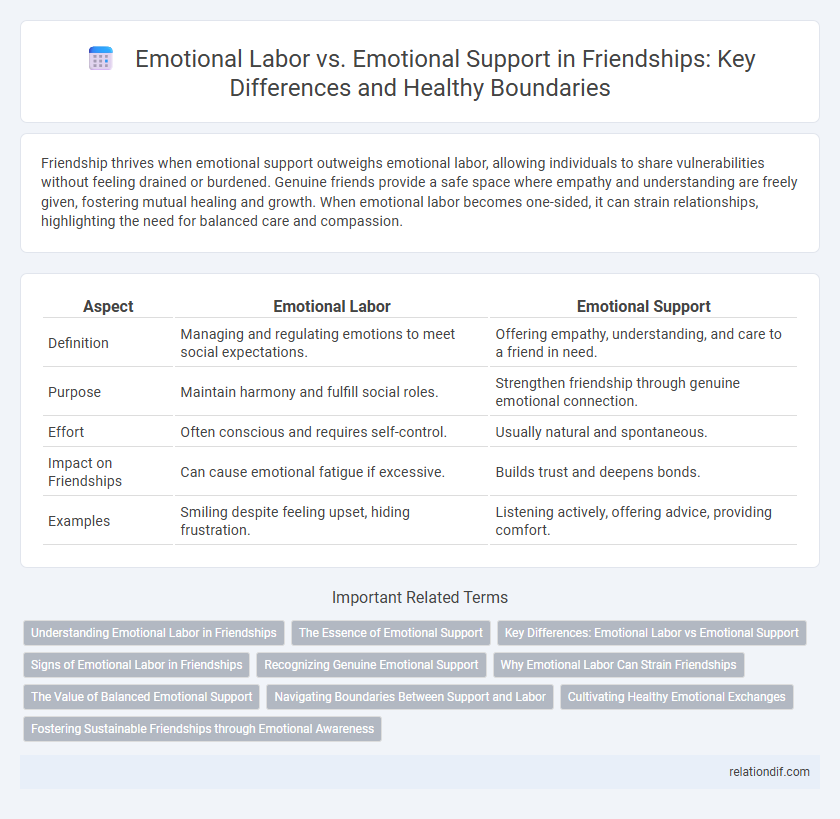Friendship thrives when emotional support outweighs emotional labor, allowing individuals to share vulnerabilities without feeling drained or burdened. Genuine friends provide a safe space where empathy and understanding are freely given, fostering mutual healing and growth. When emotional labor becomes one-sided, it can strain relationships, highlighting the need for balanced care and compassion.
Table of Comparison
| Aspect | Emotional Labor | Emotional Support |
|---|---|---|
| Definition | Managing and regulating emotions to meet social expectations. | Offering empathy, understanding, and care to a friend in need. |
| Purpose | Maintain harmony and fulfill social roles. | Strengthen friendship through genuine emotional connection. |
| Effort | Often conscious and requires self-control. | Usually natural and spontaneous. |
| Impact on Friendships | Can cause emotional fatigue if excessive. | Builds trust and deepens bonds. |
| Examples | Smiling despite feeling upset, hiding frustration. | Listening actively, offering advice, providing comfort. |
Understanding Emotional Labor in Friendships
Emotional labor in friendships involves the effort to manage and regulate emotions to maintain harmony, often through active listening, empathy, and conflict mediation. Unlike emotional support, which is the provision of comfort during difficult times, emotional labor requires ongoing investment in managing relational dynamics and balancing emotional needs. Recognizing this distinction helps friends set healthy boundaries and fosters mutual respect in their connections.
The Essence of Emotional Support
Emotional support in friendships is the compassionate response that fosters understanding and validation, differentiating it from the often draining task of emotional labor, which involves managing one's own and others' emotions. The essence of emotional support lies in genuine empathy and active listening, which create a safe space for vulnerability without the expectation of reciprocation. This type of support strengthens bonds by promoting psychological well-being and mutual trust between friends.
Key Differences: Emotional Labor vs Emotional Support
Emotional labor involves managing and regulating one's own feelings to fulfill social expectations, often requiring effort and self-control, while emotional support centers on providing empathy, understanding, and encouragement to others during emotional challenges. In friendships, emotional labor may include suppressing personal emotions to maintain harmony, whereas emotional support is actively listening and validating a friend's experiences. Recognizing these key differences helps balance personal well-being with nurturing supportive relationships.
Signs of Emotional Labor in Friendships
Signs of emotional labor in friendships include consistently feeling drained after interactions, one-sided communication where only one person shares struggles, and the burden of always managing the friend's emotions without reciprocal support. When one friend regularly acts as an emotional caretaker, providing advice, comfort, and stability without receiving the same energy in return, it indicates emotional labor imbalance. Identifying these signs helps preserve healthy boundaries and ensures mutual emotional investment in the friendship.
Recognizing Genuine Emotional Support
Genuine emotional support in friendship involves active listening, empathy, and consistent presence during both crises and everyday moments. Unlike emotional labor, which often entails one-sided effort and emotional exhaustion, true support is reciprocal, fostering mutual trust and understanding. Recognizing authentic emotional support means valuing friends who validate feelings without judgment and share emotional burdens equally.
Why Emotional Labor Can Strain Friendships
Emotional labor in friendships involves managing emotions, resolving conflicts, and providing consistent support, which can become exhausting if one person disproportionately bears the burden. When emotional labor outweighs emotional support, it creates imbalance and resentment, leading to strain and potential distancing between friends. Sustainable friendships thrive on mutual emotional support where both parties feel valued and understood without feeling emotionally depleted.
The Value of Balanced Emotional Support
Balanced emotional support in friendship involves a reciprocal exchange where both parties share emotional labor without overwhelming each other. This equilibrium fosters trust, resilience, and deeper connection, preventing burnout and emotional exhaustion. Prioritizing equal give-and-take in emotional care enhances the overall quality and longevity of friendships.
Navigating Boundaries Between Support and Labor
Emotional labor in friendship involves managing one's own feelings to meet others' emotional needs, while emotional support focuses on genuinely comforting and aiding friends during difficult times. Navigating boundaries between emotional labor and support requires clear communication and mutual respect to prevent burnout and maintain healthy dynamics. Establishing limits ensures that providing care remains sustainable and reciprocal, preserving the integrity of the friendship.
Cultivating Healthy Emotional Exchanges
Friendship thrives on cultivating healthy emotional exchanges by balancing emotional labor and emotional support, ensuring that both parties feel heard and valued. Emotional labor involves the effort put into managing and expressing feelings, while emotional support centers on providing empathy and understanding during challenging times. Prioritizing mutual reciprocity in these emotional dynamics strengthens trust and deepens the relational bond.
Fostering Sustainable Friendships through Emotional Awareness
Fostering sustainable friendships requires balancing emotional labor and emotional support, where both parties actively engage in empathy without depleting their own wellbeing. Emotional awareness helps friends recognize when to provide comfort and when to set boundaries, ensuring mutual respect and resilience. Developing this balance strengthens trust and promotes long-term connection by preventing burnout and fostering genuine care.
emotional labor vs emotional support Infographic

 relationdif.com
relationdif.com